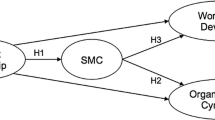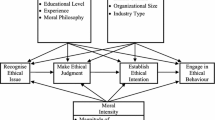Abstract
Since manager's decisions impact organizational goals and organizational ethical behavior, this researcher investigated the degree to which there are differences in the moral reasoning ability of business managers of selected industries and whether there are significant differences between top, middle, and first-line management levels. To determine the relationship between managers' locus of control and their moral reasoning ability, this study considered three independent variables: reported organizational ethical climate, locus of control, and selected demographic and institutional variables. For a foundation, this researcher relied on Kohlberg's theory of moral development, Victor and Cullen's ethical work climate theory, and Rotter's theory of internal—external locus of control (which evolved from Carl Jung). The short form of Rest's DIT instrument measured the moral reasoning abilities of the participants. The selected demographic and institutional variables (age, work tenure, education, gender, management level and industry category) provided the useful information to investigate these relationships of moral reasoning ability of individual managers. A survey questionnaire was sent to 400 managerial and executive level employees at a random sample of Fortune 500 firms throughout the United States: Dun and Bradstreet provided the researcher with a proportional stratified random sample of these 400 managerial and executive level employees at a variety of organizations. Interestingly, women in this study exhibited slightly higher (more external) mean I—E scores and (more principled) higher mean “P” score than men. While both of these results were anticipated, neither was significant. However, one major finding of this study was the statistically significant relationship between age and perceived organizational ethical climate types (Caring, Law and Code, Rule, Instrument, and Independence). Another major finding revealed a statistically significant relationship between management levels and organizational ethical climate.
Similar content being viewed by others
REFERENCES
D'Aquila, J.: 1997, Internal Control Environment Forces and Financial Reporting Decisions Made by Financial Accountants. Unpublished Doctoral Dissertation, New York University.
Derry, R.: 1989, ‘An Empirical Study of Moral Reasoning Among Managers’, Journal of Business Ethics 8, 855–862.
Gilligan, C.: 1977, In a Different Voice: Women's Conceptions of the Self and of Morality. Harvard Educational Review 47. Cambridge, MA, Harvard University
Gilligan, C.: 1979, ‘Women's Place in Man's Life Cycle’, Harvard Educational Review 29, 119–133.
Gilligan, C.: 1982, In a Different Voice: Psychological Theory and Women's Development. (Harvard University Press, Cambridge, MA).
Gilligan, C. and J. Attanucci: 1988, ‘Two Moral Orientations: Gender Differences and Similarities’, Merrill-Palmer Quarterly 34(3), 223–237.
Harris, J. R.: 1990, ‘Ethical Values of Individuals at Different Levels in the Organizational Hierarchy of a Single Firm’, Journal of Business Ethics 9, 741–750.
Jung, C. G.: 1923, Psychological Types (Harcourt and Brace, New York, NY).
Kohlberg, L.: 1958, The Development of Modes of Moral Thinking and Choice in the Years 10 to 16. Unpublished Doctoral Dissertation, The University of Chicago.
Kohlberg, L.: 1969a, ‘Stage and Sequence: The Cognitive — Developmental Approach to Socialization’, in D. Goslin (ed.), Handbook of Socialization Theory and Research (Rand McNally, Chicago), pp. 347–480.
Kohlberg, L.: 1969b, ‘Stage and Sequence’, Handbook of Socialization Theory and Research (Rand McNally, Chicago, IL).
Kohlberg, L.: 1970, Moral Stages and Moralization. Moral Development and Behavior (Holt, Rinehart & Winston, New York, NY).
Kohlberg, L.: 1976, ‘Moral Stages and Moralization; The Cognitive Developmental Approach’, in T. Lickona (ed.), Moral Development and Behavior (Holt, Rinehart, & Winston, New York), pp. 31–55.
Kohlberg, L.: 1981, The Psychology of Moral Development Volume One (Harper and Row).
Kohlberg, L.: 1982, Essays On Moral Development: The Philosophy of Moral Development (Harper & Row, San Francisco, CA).
Kohlberg, L.: 1984a, The Psychology of Moral Development Volume Two (Harper & Row Publishers, San Francisco).
Kohlberg, L.: 1984b, The Relationship of Moral Judgment To Moral Action, Morality, Moral Behavior and Moral Development (John Wiley & Sons, New York).
Kohlberg, L., C. Levine and A. Hewer: 1983, Moral Stages: A Current Formulation and a Response to Critics (Karger, Basel).
Lewin, A. Y. and C. U. Stephens: 1994, ‘CEO Attitudes as Determinants of Organization Design: An Integrated Model’, Organization Studies 15(2), 183–212.
Litwin, G. H. and R. A. Stringer: 1968, Motivation and Organizational Climate (Harvard Business School).
McKenna, J. N.: 1993, Ethical Dilemmas In Financial Reporting Situations and The Preferred Mode of Resolution of Ethical Conflicts As Taken By Certified and Non-certified Management Accountants In Organizations With Perceived Different Ethical Work Climates. Unpublished Doctoral Dissertation, New York University.
Pennino, C.: 2001, The Relationship Between Managerial Decision Style, Principled Ethical Reasoning, and Selected Variables in Business Organizations. Unpublished Doctoral Dissertation, New York University.
Rest, J. R.: 1979, Development in Judging Moral Issues (University of Minnesota Press, Minneapolis, Minnesota).
Rest, J. R.: 1982, A Psychologist Looks at the Teaching of Ethics. Hastings Center Report, pp. 29–36.
Rest, J. R.: 1983, ‘Morality’, in P. Mussen (ed.), Handbook of Child Psychology, 4th edn., Cognitive Development, Vol. 3 (John Wiley & Sons, New York, NY). pp. 556–629.
Rest, J. R.: 1986a, DIT Manual, 3rd Edn. (8/90 Revision) (Center for the Study of Ethical Development, Minneapolis, MN).
Rest, J. R.: 1986b, Moral Development: Advances in Research and Theory. Belgium Doctoral Dissertation (Praeger Publishers, Katholieke Universiteit Levven, New York, NY).
Rest, J. R.: 1988, ‘Why Does College Promote Development in Moral Judgment?’ Journal of Moral Education 17(3), 183–193.
Rest, J. R. and D. Narvaez: 1994, Moral Development in the Professions: Psychology and Applied Ethics (Lawrence Erlbaum Association, Publishers, Hillsdale, NJ).
Rotter, J. B.: 1966, ‘Generalized Expectancies for Internal Versus External Control of Reinforcement’, Psychological Monographics 80(1), 1–28.
Rotter, J. B.: 1982, The Development and Application of Social Learning Theory: Selected Papers (Praeger, New York).
Tagiuri, R. and G. H. Litwin: 1968, Organizational Climate, Exploration of a Concept (Harvard University Law School).
Victor, B. and J. B. Cullen: 1987, ‘A Theory and Measure of Ethical Climate in Organizations’, Research In Corporate Social Performance and Policy 9, 51–71.
Victor, B. and J. B. Cullen: 1988, ‘The Organizational Basis of Ethical Work Climates’, Administrative Science Quarterly (March) 101–125.
Author information
Authors and Affiliations
Rights and permissions
About this article
Cite this article
Forte, A. Business Ethics: A Study of the Moral Reasoning of Selected Business Managers and the Influence of Organizational Ethical Climate. Journal of Business Ethics 51, 167–173 (2004). https://doi.org/10.1023/B:BUSI.0000033610.35181.ef
Issue Date:
DOI: https://doi.org/10.1023/B:BUSI.0000033610.35181.ef




